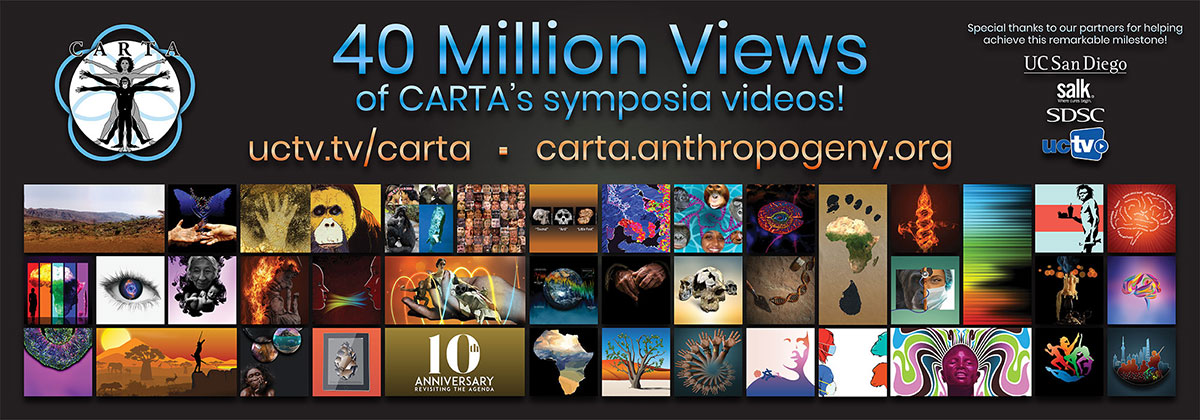News
CARTA Achieves Rare Milestone via Key Partnerships
Published March 27, 2022
Kimberly Mann Bruch, SDSC External Relations

Human origins series surpasses 40 million views with support from SDSC, the Salk Institute, UC San Diego and UCSD-TV/UCTV. Credit: Jesse Robie
A symposium series on human origins, created by the Center for Academic Research and Training in Anthropogeny (CARTA), recently reached a rare milestone of more than 40 million online views of its recorded sessions. This milestone, which ranks CARTA as University of California Television (UCTV)’s most popular science series and second most popular series overall, was accomplished by a team from UC San Diego, San Diego Supercomputer Center (SDSC), the Salk Institute for Biological Studies (Salk) and UCTV/UCSD-TV.
CARTA offers free public symposia that feature multidisciplinary experts from around the world discussing topics related to human origins and uniqueness. It was originally established as the UC San Diego Project for Explaining the Origin of Humans (POH) in the 1990s. Since 2008, CARTA has operated as an Organized Research Unit (ORU) and a collaboration among faculty at UC San Diego and Salk to promote transdisciplinary research investigating the origin of humans, or anthropogeny, drawing on methods from a number of traditional disciplines spanning the social, biomedical, biological, computational and engineering, physical and chemical sciences, and the humanities. Through its symposia, graduate and undergraduate education, and research collaborations, CARTA explores such topics as bipedalism, stone tool technologies, diet, human development, molecular biology, evolutionary medicine and anthropogenic climate change.
SDSC joined the POH effort in 2001 to provide the group with informatics support, and it became an official partner in 2008 when CARTA was formed.
“CARTA’s cyberinfrastructure has expanded along with its rapidly growing global community to include custom web portals, public cloud services, and scientific data management supporting a variety of formats such as tomography, radiograph and curated documents,” explained SDSC Cyberinfrastructure Specialist Kate Kaya, technical lead for CARTA. “I knew CARTA would be a fun project to work on when I watched CT bone scans for the Museum of Primatology on my first day. Where else could I build web-based research platforms, edit fascinating videos, see students visualize articulated skeletons, and listen in as renowned academics from around the world passionately discuss what makes us human?”
CARTA’s in-person events, primarily hosted at Salk, were well attended prior to the global COVID-19 pandemic, with an average of 400 in-person attendees and 200 more viewing via live stream. UCSD-TV produced and widely broadcast these in-person symposia via UCTV and online channels. Thanks to the live stream infrastructure that SDSC and Salk established in 2012, and the high-quality UCSD-TV video production process, CARTA was well positioned to transition to online-only events at the start of the pandemic in early 2020. SDSC led CARTA’s initial efforts to offer completely virtual events with live interactive expert panel discussions, working with the team at UCSD-TV to ensure the continuity of CARTA’s core mission to explore and explain human origins. These online symposia have been extremely successful, with CARTA’s most recent virtual event reaching roughly 660 live stream viewers from across 40 countries and territories. CARTA’s live symposia are also recorded and made freely available to the public on multiple websites, including CARTA, UCSD-TV, iTunes, and YouTube. These recordings have proved to be hugely popular with over 40 million views online and counting.
“CARTA’s long-term partnership with the San Diego Supercomputer Center has been extremely valuable,” said Dr. Ajit Varki, CARTA’s founding co-director and distinguished Professor of Medicine and Cellular & Molecular Medicine at UC San Diego. “Having access to state-of-the art cyberinfrastructure and information technology expertise has played a key role in advancing CARTA’s mission by allowing us to rapidly meet evolving community needs.”
"The type of transdisciplinary research promoted by CARTA is the epitome of convergence research that SDSC excels in facilitating. We are privileged to be able to support the breathtaking diversity of researchers that CARTA brings together to address fundamental questions about the human phenomenon,” said Chaitan Baru, SDSC Distinguished Scientist and director of the Advanced Cyberinfrastructure Development lab at SDSC.
This year CARTA turns its attention toward the impact humans have on our planet. The recently held symposium on March 5, “Human Origins and Humanity's Future: Past, Present and Future of the Anthropocene,” and the upcoming symposium on May 13, “Humans: The Planet-Altering Apes,” both address the critical question of where we are going, as experts consider how a single species evolved the capacity to completely alter the surface of an entire planet.
About San Diego Supercomputer Center
SDSC, located at UC San Diego, is considered a leader in data-intensive computing and cyberinfrastructure, providing resources, services and expertise to the national research community, including industry and academia. Cyberinfrastructure refers to an accessible, integrated network of computer-based resources and expertise, focused on accelerating scientific inquiry and discovery. SDSC supports hundreds of multidisciplinary programs spanning a wide variety of domains, from earth sciences and biology to astrophysics, bioinformatics and health IT.

